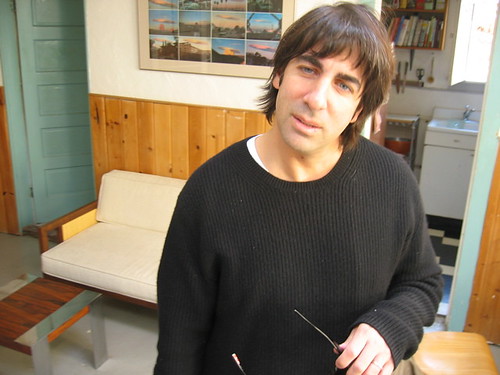|
||
|
Seth Swirsky is an American pop music songwriter, author, recording artist and noted baseball memorabilia collector. He has many many talents, but we here know him best for his amazing power pop albums. In 2005, Seth Swirsky’s own album, Instant Pleasure, won Best Pop Album at the Los Angeles Music awards. He then collaborated with Mike Ruekberg under the group name ofThe Red Button, which was also considered one of the best power pop albums of that year (#2 in our readers poll). Swirsky’s second solo album, Watercolor Day was released on May 18, 2010. He co-produced it with Cloud Eleven’s, Rick Gallego. So much stuff to talk about… catch up with Seth at his website,www.seth.com |
||
|
Tell me how you got into the music business initially. He put on my cassette of the song, stopped it after about 20 seconds, rewound it and played it again. This time, he stopped the song after about a minute and rewound it. The third time, he played the entire song. As I watched this process, I nervously hoped that he liked the song. When he was done listening to it, he offered me a contract on that song and said that he wanted to take it immediately (after I made a slight change in the original demo) to Charles Koppleman, who was looking for a song just like this for his client, Barbra Streisand, for her comeback album. When I returned to college the next week, I was unsure as to whether I would get a cut – probably a single – on Barbra Streisand’s record. It turned out that it came down to two songs: mine and a song called Coming In and Out of Your Life written by Sir Andrew Lloyd Webber, which she chose. I didn’t mind losing out on the opportunity because it gave me the confidence, at a young age, to play in the big leagues. You’ve been a prolific songwriter for many years, and also produced such high quality albums under The Red Button and your own name. Tell me a little bit about the songwriting process for you. Will you be touring in support of Watercolor Day? I heard another The Red Button album is due soon. What can you tell me about it? You’ve played The Cavern in Liverpool. As a fellow Beatles fanatic who has never been there… what’s the experience like? You are a man of so many multiple talents. Tell me about your Beatles film A Year In The Life. I saw the trailer and wonder when this will be released. Just to interview all those people seems incredible. The project took me five years from the time that I interviewed May Pang in late 2004 to my last interview with Sir Ben Kingsley in 2009. I’ve been editing it as I go along. It has been extremely thrilling, especially hanging out at Norman Smith’s house all afternoon. (The Beatles’ original and longtime first engineer.) He was 84 when I filmed him. He had ALL the stories; so, I just went song by song. He was a very warm man. I could understand how the young Beatles just loved him. I asked most interviewees for 15 minutes of their time, but they all ended up talking on film for around an hour. Some of the best stories weren’t the stories they originally told! Each interview was cut down to about a minute and 20 seconds. Fifty-five stories in a little over 90 minutes! On to another love of yours, baseball. There is so much great content on your site, especially your ball collection. What is your favorite baseball team and all-time favorite player? It was then that I started to collect baseball artifacts. My prized possession is the baseball that went through Bill Buckner’s legs in Game 6 of the 1986 World Series. It’s currently on display at the Mets Museum at their ballpark, Citi Field. You’ve interviewed so many celebrities in sports and music. What would Seth Swirsky the interviewer ask Seth Swirsky the musician? Thanks so much for your time, Seth – I can’t wait for the next album! |
